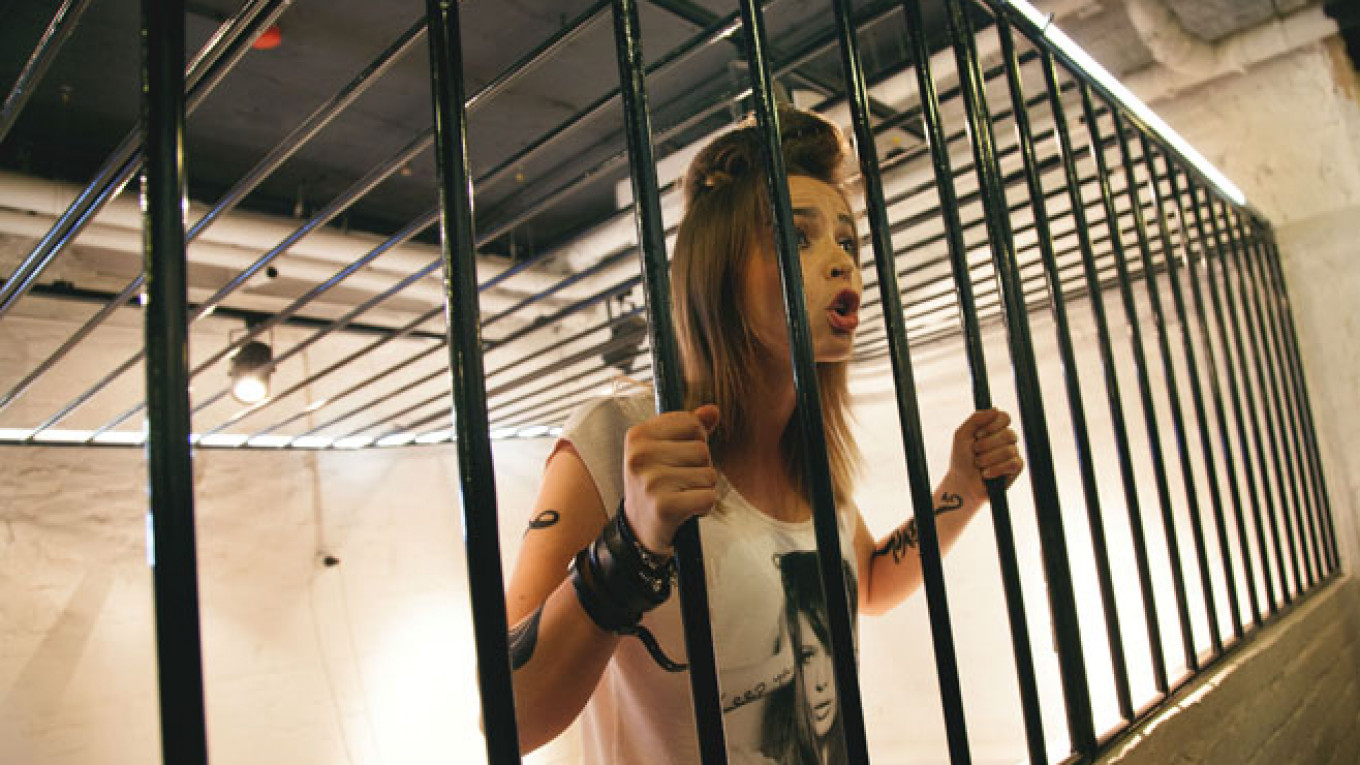It's a wonderful idea for reopening a renovated old building, to work out some of the demons and explore some of the angels still lingering in the dark corners. Sasha Denisova's "Decalogue on Sretenka" attempts to do just that for one of Moscow's theater spaces — the affiliate stage of the Mayakovsky Theater near Sretenka Ulitsa — that has been closed for years.
Working with director Nikita Kobelev and a large group of actors, Denisova dug into the past not only of the building that actually stands on Pushkaryov Pereulok, but of the whole nearby neighborhood that centers on the Sretenka thoroughfare. They compiled 10 stories in 10 scenes and, in the course of telling them, they even give two groups of spectators following divergent itineraries a tour of the renovated building.
Scenes take place on stairwells, the foyer and several backrooms. Three scenes even take place in various corners of the newly stripped, newly expanded performance space, which used to be separated into stage and auditorium, but which now is simply a huge, open multipurpose hall.
I'll spill right here at the beginning that I had trouble staying with much of what transpired during the performance. It's a slow-moving creature, only in part because the show must constantly wait for the peripatetic audience to catch up with it. It also seemed that several tales were included not because they were good stories well told, but because they struck someone as interesting ideas early in the planning, after which no one ever thought to take scissors to the script.
Pulling Anton Chekhov into any narrative about theater in Moscow is, for example, a seeming no-brainer. But the long, involved tale of a shy Chekhov visiting a brothel full of crude, in-yer-face women in order to gather character types for his short stories, just doesn't go anywhere.
A diva singer rehearsing with a cantankerous director and a wishy-washy conductor gives us a chance to hear about some of the famous people who have worked on this stage over the decades. But aside from the listing of a few famous names, the sketch marches in place for a very long time.
A scene of a God-fearing woman standing up to Godless secret policemen, presumably in the 1930s, suffers from a common problem that affects anyone anywhere trying to inject the piety of faith into a theater performance: It is heavy-handed, and the easy morality is unconvincing.
But, okay, I've said my harshest words. It's also imperative to point out that several scenes hit their mark.
Two involve the last woman living in the building who remembers well the history of her neighborhood. One swift, meaty scene depicts the confrontation between two men — one the grandson of a prisoner who was executed by the secret police, the other the grandson of the man who carried out the execution. One time-warping scene begins as the tale of a contemporary young woman (the wonderfully unhinged Natalya Palagushkina) who betrayed a friend, but morphs into a violent interrogation in the bowels of the Lubyanka secret police headquarters, presumably, again, in the 1930s.
The Lubyanka headquarters' close proximity to Sretenka gives this show no peace and provides for some of its most convincing moments.
But arguably the pinnacle of "Decalogue" takes place in the smallest space of all, the audience squeezed into a few chairs scattered in front of the actors' backstage coatrack. This serves as the cozy apartment of a grandmother (Lyudmila Ivanilova) who does not want to leave her life-long dwelling, as her granddaughter (Anastasia Tsvetanovich) gently tries to convince her to sell, while a thoughtful real estate agent (Yulia Solomatina) looks on sadly.
Here better than anywhere else we sense the pull of flesh and damp, warm breath on the cold, hard, seeming indifference of architecture. The actors playing grandmother and granddaughter occasionally trade roles, playing directly with the truth that age is a number and youth is a state of mind.
Designers Alexei Tregubov and Anna Rumyantseva employ a minimum of props to ground the various scenes in place. The cozy apartment, for example, consists of an old armoire and a sofa. The Lubyanka interrogation scene puts bars around the actors and seats the audience outside them.
If "Decalogue on Sretenka" is uneven, it does have a few moving, insightful moments to recommend it.
"Decalogue on Sretenka" plays Oct. 18 at 7 p.m. at the Mayakovsky Theater's Stsena na Sretenke, located at 21/24 Pushkaryov Pereulok. Metro Sukharevskaya. 495-608-8061. Mayakovsky.ru. Running time: 2 hours, 55 minutes.
Contact the author at [email protected]
A Message from The Moscow Times:
Dear readers,
We are facing unprecedented challenges. Russia's Prosecutor General's Office has designated The Moscow Times as an "undesirable" organization, criminalizing our work and putting our staff at risk of prosecution. This follows our earlier unjust labeling as a "foreign agent."
These actions are direct attempts to silence independent journalism in Russia. The authorities claim our work "discredits the decisions of the Russian leadership." We see things differently: we strive to provide accurate, unbiased reporting on Russia.
We, the journalists of The Moscow Times, refuse to be silenced. But to continue our work, we need your help.
Your support, no matter how small, makes a world of difference. If you can, please support us monthly starting from just $2. It's quick to set up, and every contribution makes a significant impact.
By supporting The Moscow Times, you're defending open, independent journalism in the face of repression. Thank you for standing with us.
Remind me later.







